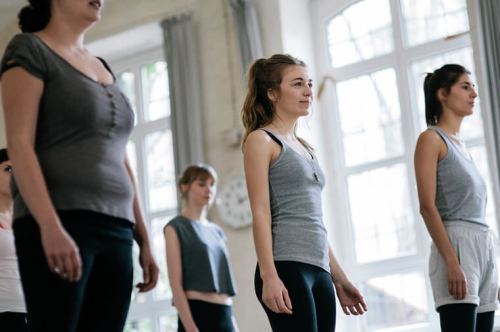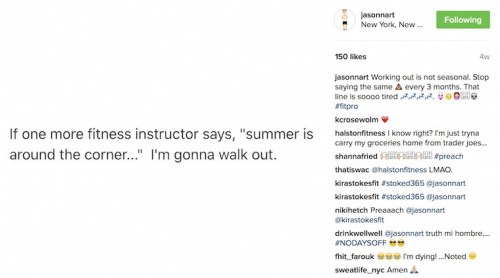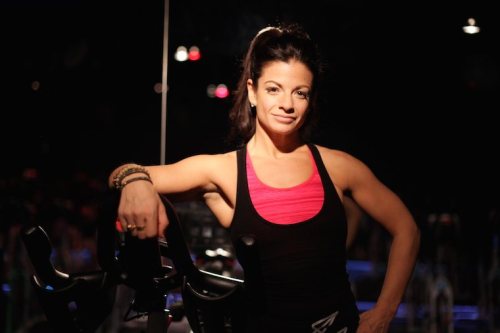Why aren’t more gyms and fitness trainers embracing body positivity?
Why aren't more gyms and fitness trainers shelving talk of bikini-wearing goals for motivation and inspiration, and instead embracing body positivity?

During the week that Amy Schumer’s sketch calling out body-shaming salespeople went viral—and was celebrated for its body-positive ethos—I walked by a sign in front of a trendy downtown Manhattan Pilates studio.
“Abs Arms Ass,” it said, simply, in big, bold lettering, as if daring passersby to take stock of theirs and not run inside to sign up for a class to tone and tighten their own.
The contrast illustrates a phenomenon on the fitness scene: While popular culture and media outlets have initiated a shift towards more body positive language, including talking about exercise and fitness in terms of benefits beyond weight loss—like happiness, strength, and overall health and longevity—trainers and gyms, overall, have not.
Feeling good about results is not the same thing as being shamed into believing you need to get them.
A few months ago, Women’s Health made a splash when they announced that they were ending the use of the term “bikini body“—a move many commended, since studies have consistently shown that exposure to unrealistic thin-body ideals in mass media affects women’s body image in serious ways. “The research is pretty clear,” says psychologist Alexandra Corning, PhD, head of Notre Dame’s Body Image and Eating Disorder Laboratory. “Being presented with that over and over and over is bad for women on the whole.”
But what about when a workout studio yells at you via email to sign up for BIKINICAMP in order to get “#TIGHT FOR MEMORIAL DAY”? Or during a tough interval in spin class when an instructor tells you “to push harder so you won’t feel guilty eating later”?
Is there a reason for this discourse disconnect—and, more importantly, does it matter?
Surrounded by six packs
When you start to ask questions about why those in the fitness industry often speak to peoples’ insecurities and fears about their bodies, most people tend to cite profit. In some aspects, it makes sense: Studies have shown that negative body image can be a motivator to exercise, and marketing to the desire for a hot bod come beach season likely works. (Exhibit A: Equinox’s ads that often seem to be advertising group sex with models rather than gym memberships.)
But that theory doesn’t fully explain why fitness instructors, when faced with a room filled with people who’ve already paid $35 each to sweat profusely, resort to shouting tired body-shaming phrases like “summer bodies are made in winter!” (My body was made in 1985, actually, and it seems to stick with me regardless of the season. Fingers crossed.)
“People aren’t mindful about how powerful their words are,” suggests Dyan Tsuimis, a top trainer and instructor at Swerve in New York City who recently wrote an op-ed for The Sweat Life on how summer-body language among trainers needs to stop. “They’re almost on autopilot thinking, ‘This is why you’re here; you want a great body’—when in reality, everyone has different goals.”

Another possibility: We all say we’re body positive because we’ve learned—from media and celebs like Nikki Reed,Sienna Miller, and Lena Dunham—that that’s now the acceptable way to talk about obsessing over our physiques. “We’re learning to say ‘I’m doing it for health,'” notes Corning, who adds that the reality is we all grew up bombarded by a culture of aesthetic perfection, and the desire to look a certain way is ingrained in us whether we realize it or not. “You can’t blame people,” she says. “They’re buying into something they’ve been sold.”
So maybe trainers are just being honest, and the rest of us are shouting, “Strong is the new skinny!” while subconsciously reaching desperately towards a new cultural body ideal—toned instead of twig?
Maybe trainers are just being honest, and the rest of us are shouting, “Strong is the new skinny!” while subconsciously reaching desperately towards a new cultural body ideal
It makes me think about the fact that trainers, living in a sea of six packs, are bombarded by body ideals more than anyone—not to mention the pressure on them to look a certain way in order to succeed in their profession. And as you get closer to the cultural body ideal, Corning says, the more validation you feel…and the more you really want to reach it.
This, I’ve experienced. In the midst of a recent training regimen designed to help me build strength, I started noticing my arms in the mirror. “Wow, I’m going to look so good in my bikini this summer!” I thought. And then, “Oh my God! I’m writing a story on bikini-body language—shut up!” How could the seriously muscled set not constantly be thinking about aesthetics—and in turn, pass that focus on?
Is fit talk fat talk?
But to the crux of the issue: Is this kind of body-negative language during workouts even that bad? Many people, when the topic comes up, say, “What’s so wrong with wanting and working towards a firmer butt if I’m going to look and feel good because of it?”
Nothing inherently, of course. But feeling good about results is not the same thing as being shamed into believing you need to get them. And according to trainers who are trying to change the discourse, like Tsuimis (and many others who, it should be noted, are not mentioned here), talking about the workout in terms of aesthetic goals assumes the instructor knows what motivated each person in class to show up.
Take, for example, someone who is in the middle of a big weight-loss journey and they’ve had an awful, emotional day but still managed to make it to class. “To tell someone in that place that you have to have skinny or toned arms to wear a bathing suit…it can be really detrimental and set them back,” Tsuimis says.

Corning also does a lot of research on “fat talk,” the self-disparaging body/weight/food talk women engage in constantly. (“Wait, are my toned arms making my legs look fat?”) Fat talk has been found to increase body dissatisfaction—and to be highly contagious. To me, it seems like getting body-negative cues throughout a workout could encourage it (although there’s no research yet on the topic).
Think about it: If an instructor keeps talking about getting a hot ass during squat sequences, can’t you just hear the locker room conversation after? “Oh my God, I couldn’t even do those squats. My ass is so flabby.” Fat talker number two, now bitten by the bug, chimes in: “There’s no way you’ve got as much cellulite as I do.”
Body positive reinforcement
So what should trainers say instead? “People have their own reasons for doing things, and they’ll challenge themselves in their own way if you let them,” says Tsuimis, who suggests reminding exercisers of their goals and giving positive reinforcement based on them. “The goal should be to inspire them to be better in that moment.”
Ultimately, that kind of encouragement could have effects that last much longer than sculpted abs will. “If you’re only pursuing the superficial…you’re less resilient to life’s swings and arrows, ” Corning says. “You can’t expect to feel really whole and good about yourself at the end of the day.” And isn’t that really what we’re all striving for?
For more brilliant body image insight, Misty Copeland has some seriously wise words. Or check out this art project inspired by the stereotype of the “Pilates body.”
Sign Up for Our Daily Newsletter
Get all the latest in wellness, trends, food, fitness, beauty, and more delivered right to your inbox.
Got it, you've been added to our email list.









